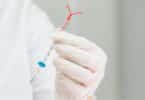About one in every eight couples struggle with getting pregnant or carrying a baby to term. About a third of those cases are due to infertility issues within the female. Treatments like medication or surgery are an option for some, but for others – including those that the former options fail to work – the only options are assisted reproductive therapies like IVF (in vitro fertilization).
In IVF, lab specialists manually insert sperm into an egg in a clinical setting. If the egg fertilizes, the embryo is then cultured and grown, and then implanted into the woman’s uterus. Women may be requires to take injectable fertility drugs, like hCG, to trigger egg production. Unfortunately, some of these drugs actually carry a risk to the women taking them.
According to the research team, led by Professor Waljit Dhillo of the Department of Medicine at Imperial College London in the UK, these drugs can cause some women to suffer from ovarian hyperstimulation syndrome (OHSS). This condition triggers overstimulation of the ovaries, which can become swollen and extremely painful. In some cases, the condition can lead to rapid weight gain, shortness of breath, abdominal pain, and vomiting.
“OHSS is a major medical problem,” Professor Dhillo told Medical News Today. “It can be fatal in severe cases, and it occurs in women undergoing IVF treatment who are otherwise very healthy.”
To try and remedy this issue, he and his colleagues tested a naturally occurring hormone called kisspeptin on 53 women undergoing IVF to see if it would trigger ovulation safely and effectively. After they received the kisspeptin injections, 51 out of the 53 developed mature eggs, and 49 of them had either one or two fertilized embryos that could be transferred into the uterus. In all, 12 became pregnant, which the researchers say is a “good outcome” when compared to standard IVF.
Allison Harper, one of the study participants, gave birth to a baby boy in October. She said that, after several IVF cycles, this one left her feeling the least amount of discomfort. She also said she experienced less pain and swelling during the treatment.
Researchers believe that kisspeptin caused fewer side effects than hCG because kisspeptin doesn’t stay in the blood as long. This means that the hormone is broken down faster, which, in turn, reduces the chance of overstimulation of the ovaries. And being that it was able to stimulate egg production, Dhillo and colleagues are optimistic about the use of kisspeptin in IVF procedures in the future.
“Our study has shown that kisspeptin can be used as a physiological trigger for egg maturation in IVF therapy,” Professor Dhillo said. “It’s been a joy to see 12 healthy babies born using this approach. We will now be doing more studies to test whether kisspeptin reduces the risk of OHSS in women who are not most prone to developing it, with a view to improving the safety of IVF.”
Related Articles:







